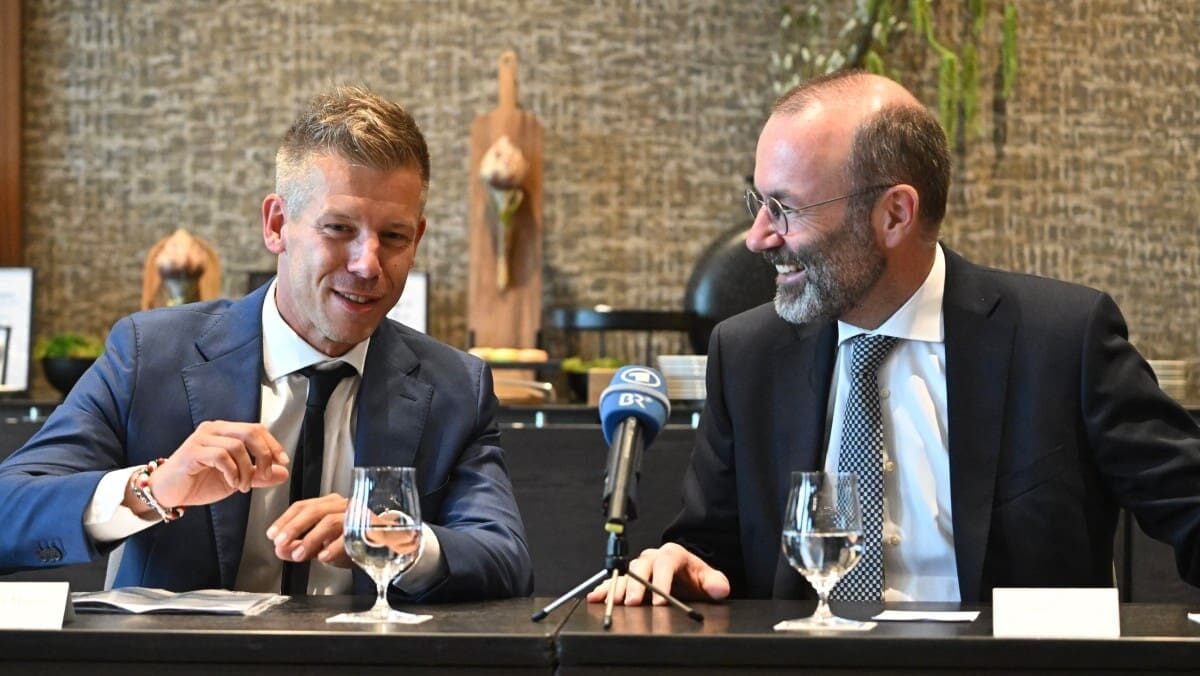
EPP-chairman Manfred Weber (right) with Tisza-leader Péter Magyar.
Photo: Attila Kisbenedek / AFP
The leaders of von der Leyen’s centrist European People’s Party (EPP), the largest group in the European Parliament, have voted to admit 14 new MEPs from six parties from across Europe on Tuesday, June 18th, growing to 188 seats after two MEPs defected since the elections.
The new MEPs include two reps from the Dutch farmers’ party BBB and another from the centrist New Social Contract (NSC), both coalition partners of the right-wing populist Geert Wilders’ Freedom Party (PVV); two from the Czech Mayors and Independents (STAN); one from the Danish Liberal Alliance (LA); and another representing the German Family Party (FPD).
According to the group’s official statement, however, the largest new delegation is the Hungarian center-right opposition Respect and Freedom (Tisza) party, which was launched only a few months ago. Tisza finished in second place in the Hungarian EU elections with nearly 30%, claiming 7 seats in Brussels.
Despite promising to give up on his seat in Brussels and continue working back home, Tisza leader Péter Magyar has set his eyes on leading his party’s delegation in the Parliament instead. Magyar negotiated his party’s entry to EPP directly with the group’s chairman, Manfred Weber, last week, and was present at the vote on Tuesday.
Tisza’s seven MEPs are now officially part of EPP, even though there’s one issue where Magyar seems to be closer to the constantly demonized Hungarian PM Viktor Orbán than his new comrades—Ukraine.
“We share the position of the [Hungarian] government: we will not send troops or weapons to the Ukraine from Hungary,” Magyar told the group’s leader upfront, adding that Hungary’s situation regarding the war is “sensitive,” and promised his support for Ukraine “with all other manner and tolls.”
The EPP, famous for being strict about its “pro-Europe, pro-NATO, and pro-Ukraine” conditions for allies, doesn’t seem to care the slightest about Magyar not being too enthusiastic about the last two of those as long as it can simultaneously boost its numbers and deliver a blow to Orbán.
“Everything he says in relation to Ukraine and the war, the Orbán propaganda machine uses against him. So it is very clear why he is prudent about that,” an EPP spokesman said afterward.
Protesting Tisza’s entry as well as the group’s “war doctrine,” Hungary’s Christian Democratic People’s Party (KDNP), Fidesz’ domestic coalition partner, announced that they would quit EPP on the same day.
“Due to its leftward shift and identity, the EPP is no longer what its Christian Democratic founders built it to be,” the party’s statement reads. “The EPP’s war doctrine runs counter to the commitment to peace for which the European Union itself was founded,” it adds, noting that its MEP, György Hölvényi “will continue his fight for persecuted Christians” nonetheless.
Apart from Hölvényi’s, the EPP lost another seat with the defection of Belgium’s Les Engagés party to the liberal Renew group.
Meanwhile, according to unconfirmed reports in the Italian media, Giorgia Meloni has supposedly rejected the advances of Orbán’s governing Fidesz party, closing the door of her European Conservative and Reformist (ECR) group as it seeks to form a “center-right” coalition with EPP and Renew.
According to the Corriere della Sera, Meloni said ‘no’ to Orbán on Monday, during the EU leaders meeting in Brussels, despite her publicly stated goal of ECR overtaking the Renew as the third largest bloc in Brussels by adding new MEPs. The paper claims that Meloni’s motivation was that Fidesz would bring “more disadvantages than advantages” to ECR, as several members (like the Belgian N-VA and the True Finns) are supposedly threatening to quit if Orbán is admitted.
At the time of writing, no other source had confirmed this information.
